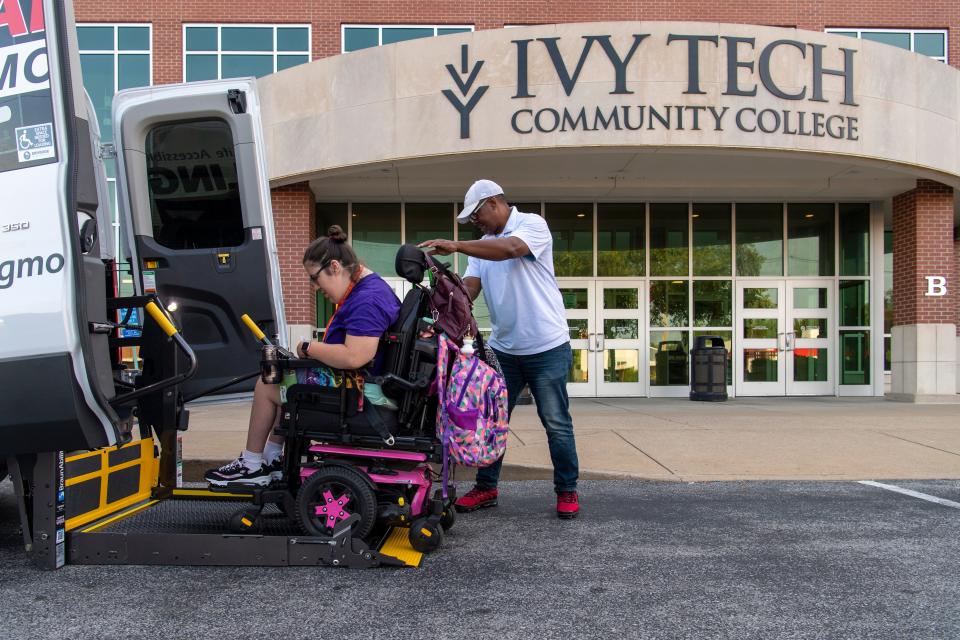5 ways Courier & Press reporting made an impact in 2023
The Evansville Courier & Press celebrates its 179th birthday this month, having come a long way since its inception in 1845 as a four-page weekly, the Evansville Courier, founded by local attorney William Newton.
For every day in its history, the Courier & Press has sought to serve the greater good of the Tri-State.
It's our job to hold people accountable, to shine a light on wrongdoing and to celebrate our neighbors' successes. We recognize the privilege and responsibility that come with our platform, and we hope to enhance community conversations and advocate for those whose voices may not otherwise be heard. We do this work because we care.
Here are just a few examples of how our reporting made a difference in the Tri-State in 2023.
Questionable spending in former posecutor's non-profit program
The Courier & Press reported in March that bank statements for My Goals Inc., a nonprofit for at-risk youth started in 2011 by then-Vanderburgh County Prosecutor Nick Hermann, showed more than $14,000 in 71 ATM and bank withdrawals and thousands of dollars in purchases at fast food restaurants, women's clothing stores, hair salons and beauty retailers, convenience stores, pharmacies and supermarkets and in out-of-town shopping sprees.
There were also purchases at a liquor store, a high-end clothing outlet and a designer-label shoe store.
Regene Newman, the former Vanderburgh County prosecutor's aide at the center of Courier & Press reporting on the questionable expenditures, was fired from her local government position the week the report was published.

Superior Court Judge Wayne Trockman, along with Sheriff Noah Robinson and Community Corrections program director James Akin, made the decision to terminate Newman's employment. Newman was in charge of the roughly $3 million program's financial affairs, including grants. Newman got that job after leaving her position with the prosecutor's office.
"Quite frankly, I don’t know much more, I think, than the community knows," Trockman said at the time. "And much of that, some of that, is based upon (Courier & Press) reporting. But it all caused us to lose our confidence in (Newman) to do the job."
Evansville police using AI software to make arrests
The Evansville Police Department's use of facial recognition technology did not garner public attention until this year when the Courier & Press reported that the department had quietly utilized Clearview AI’s tools for years with little scrutiny or oversight.
The CEO of Clearview AI, whose company provides the Evansville Police Department with facial recognition technology, said the software's results are "only leads for law enforcement" and should be treated like an "anonymous tip" from the public.
Evansville police, however, have claimed in sworn arrest affidavits that they used Clearview AI to conclusively identify crime suspects, according to a Courier & Press review of probable cause affidavits that refer to facial recognition technology.
“The Clearview app is neither designed nor intended to be used as a single-source system for establishing the identity of an individual, and users may not use it as such,” the company’s User Code of Conduct states. "Furthermore, search results produced by the Clearview app are not intended nor permitted to be used as admissible evidence in a court of law or any court filing."
But the results of Clearview AI facial recognition searches do show up in arrest affidavits filed in Vanderburgh County courts, often without any additional context describing the software's limitations — a practice that experts said could mislead judges about the accuracy of facial recognition technology.
Vanderburgh County Prosecutor Diana Moers and the EPD maintain that local law enforcement use Clearview AI and other advanced investigative tools responsibly and abide by all relevant state and federal laws.
In total, the EPD cited Clearview AI or facial recognition technology at least 10 times in arrest affidavits linked to shoplifting or theft cases between 2021 and 2023, public records show, though the true number may be higher: Detectives are under no obligation to disclose their use of facial recognition technology in arrest affidavits.
Pushing for more transparency from the EVSC
The Evansville Vanderburgh School Corp. spent eight months fighting the release of arrest records in their schools. The Courier & Press filed multiple open records requests to obtain the data, which Indiana’s public access counselor repeatedly said was public information – with state statute to back him up.
Despite that, EVSC’s attorney, Pat Shoulders, and Superintendent David Smith blocked the release. When the corporation finally did hand over information, it seemed to be written in internal code and none of it contained the names of the schools or information on the offenses committed.
In November, the Courier & Press took a different route and filed a records request with the Indiana Department of Education. About a month later, the IDOE sent not only arrest statistics for the EVSC, but for every public school in the state. It included arrests numbers and the reasons for those arrests.
The data showed there had been more than 60 arrests of EVSC students during the 2021-22 and 2022-23 instructional years – including 29 arrests at the Academy for Innovative Studies in ’22-23, ranking it seventh in the state.
Some of those arrested were as young as seventh grade. The alleged offenses ranged from battery to drug possession to bringing firearms to school.
Local board ends relationship with local home-detention service
In January 2023, the Community Corrections Advisory Board voted to replace ABK Tracking as its provider for electronic home detention. The move came amid concerns about high costs, and a federal lawsuit that accused ABK, Judge David Kiely and Vanderburgh County of charging exorbitant prices and revoking participants' probation when they couldn't pay.
The lawsuit was partially sparked by the Courier & Press' years-long investigation.

The decision to change to Kentucky-based Corrisoft ultimately sparked an internal investigation to see if Community Corrections Director James Akin mislead the board in the run-up to the January vote. Former Posey County Prosecutor Jodi Uebelhack ruled in March that she found no evidence of misleading comments.
In June, a federal judge dismissed the suit against ABK, saying the court lacked jurisdiction in the matter. He also disputed plaintiffs' claims that ABK's fees weren't reviewable in state court, even though ABK's fees weren't listed in bail or probation orders and weren't communicated to the customers until they reported to ABK.
ABK, Kiely and the county all denied any wrongdoing.
Issues with METS Mobility services impact daily lives
In July, the Courier & Press spoke with two METS Mobility users who shared their struggles with reliable transportation from the local public transportation system.
METS Mobility users faced the consequences as the operation dealt with a lack of drivers, resulting in extended wait times and canceled rides.
The two women who spoke with the Courier & Press said they had dealt with calls to inform them of canceled rides when they were already outside waiting, along with drivers simply never showing up.

The lack of reliability left one of the women seeking other means of mobility transportation, which might not be an option for everyone financially.
The Mobility service had six drivers at the time, 14 shy of a full staff. Both dispatchers – fully staffed would be three – were driving from "time to time" to help offset the current need, according to METS. Fixed route drivers, as well as maintenance shop personnel, are also asked to drive for the Mobility service on their days off.
This article originally appeared on Evansville Courier & Press: 5 ways Courier & Press reporting made an impact in 2023

